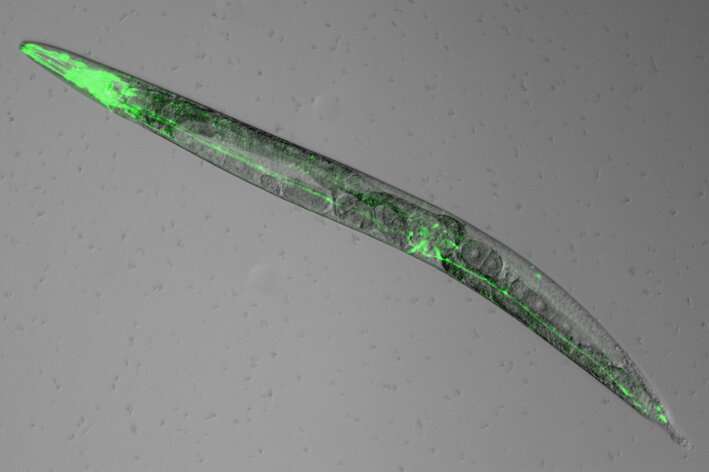
Melatonin is used as a dietary supplement to promote sleep and get over jet lag, but nobody really understands how it works in the brain. Now, researchers at UConn Health show that melatonin helps worms sleep, too, and they suspect they’ve identified what it does in us.
Our bodies produce melatonin in darkness. It’s technically a hormone, but you can readily buy melatonin as a supplement in pharmacies, nutrition stores, and other retail shops. It’s widely used by adults and often in children as well.
Melatonin binds to melatonin receptors in the brain to produce its sleep-promoting effects. Think of a receptor as a keyhole, and melatonin as the key. The two keyholes for melatonin are called MT1 and MT2 in human brain cells. But scientists didn’t really know what happens when the keyhole is unlocked. Now UConn Health School of Medicine neuroscientists Zhao-Wen Wang and Bojun Chen and their colleagues have identified that process through their work with C. elegans worms, as reported in PNAS on Sept. 21. When melatonin fits into the MT1 receptor in the worm’s brain, it opens a potassium channel known as the BK channel.
A major function of the BK channel in neurons is to limit the release of neurotransmitters, which are chemical substances used by neurons to talk to each other. In their search for factors related to the BK channel, the Wang and Chen labs found that a melatonin receptor is needed for the BK channel to limit neurotransmitter release. They subsequently found that melatonin promotes sleep in worms by activating the BK channel through the melatonin receptor. Worms that lack either melatonin secretion, the melatonin receptor, or the BK channel spend less time in sleep.
But wait—worms sleep?
Indeed they do, says Chen. There’s actually been quite a lot of research on worm sleep, and researchers found that sleep is similar between worms and mammals like humans and mice.
Source: Read Full Article
